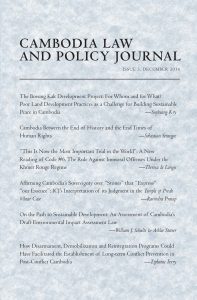BY SIMON M. MEISENBERG
Executive Summary[1]
Cambodia was one of the first Asian countries to ratify the Rome Statute of the International Criminal Court (ICC). By ratifying the Statute in 2002, the Cambodian Government sent a powerful message to its population that lessons had been learned from the country’s own past, and that the mass crimes and violations of humanitarian law experienced during the Khmer Rouge regime would not be met with future impunity. This step, combined with participation in the Extraordinary Chambers in the Courts of Cambodia (ECCC) —addressing Khmer Rouge crimes committed between 1975 and 1979 — has seemingly fulfilled the Government’s obligations under international law to bring past perpetrators of mass violence to justice and to enact accountability mechanisms to deter such crimes in the future.
The ICC is based on a system of complementarity and therefore can address acts of genocide, crimes against humanity and war crimes only if a member state, such as Cambodia, is unwilling or unable to prosecute the alleged perpetrators in its own courts. In order to ensure that such international crimes can be prosecuted in national courts, member states must enact laws criminalizing these acts in their domestic criminal system. Attempts to prosecute international crimes in the absence of such legislation within a constitutional framework would breach the principle of retroactive criminalization and could therefore result — under the ICC complementarity principle — in a finding by the ICC of national inability to prosecute. Many ICC member states have therefore recognized that the internal implementation of the ICC Statute is a necessary step toward compliance with the principle of complementarity. Cambodia has followed this trend and enacted implementing legislation in its new 2009 Cambodian Criminal Code (CCC).
This article scrutinizes the enacted international crimes provisions in the CCC. Even though the CCC criminalizes genocide, crimes against humanity and war crimes, a closer examination reveals that it is in need of reform — particularly its war crime provisions. While the CCC’s definitions of genocide and crimes against humanity are largely identical to those in the ICC Statute, this is not the case for crimes committed during an armed conflict. First, contrary to the ICC Statute, a single definition is used for all types of armed conflict, whether international or non-international. This in not of particular concern, as the current tendency in international law is to blur this historical distinction in international humanitarian law. Of greater concern, the CCC criminalizes only a small number of the war crimes listed in the ICC Statute. Important war crimes have not been criminalized in the CCC, including intentional attacks against the civilian population or civilian objects; improper use of the flag of truce or other specific insignias or emblems; declaration that no quarter will be given; abolition of the rights and actions of the nationals of a hostile party; use of prohibited weapons; attacks against persons and objects using distinctive emblems of the Geneva Conventions in conformity with international law; and the conscription, enlistment and use of children in hostilities under the age of 15 in hostilities. The omission of criminalizing the recruitment of children under the age of 15 into armed groups or forces is of particular concern, given that article 48 of the Cambodian Constitution specifically protects children during wartime.
Another discrepancy is that, although the CCC applies ordinary modes of attribution to the commission of international crimes in Cambodia, it does not include the mode of superior responsibility. Thus, under Cambodian law, there is no way to hold a superior responsible if he or she fails to prevent or punish crimes despite knowing that the crimes will be or have been committed. This omission could have significant implications for any prosecution of international crimes in Cambodia because superior responsibility is considered an important tool for prosecuting mass atrocities, especially crimes committed with the assistance of hierarchical organizational structures.
Additional bars to prosecution of international crimes also should be addressed. For example, Cambodian law and the CCC lack any modifications to certain governmental immunities when mass crimes are alleged. Nevertheless, the CCC effectively and positively denies any future amnesties or statutes of limitations for genocide, crimes against humanity and war crimes.
The article concludes by finding that, by criminalizing genocide, crimes against humanity and war crimes in its new criminal code, Cambodia has complied with some, but not all, of its obligations under the ICC Statute. Divergent definitions of crimes and the failure to recognize some ICC crimes and modes of responsibility may result in an ICC determination that Cambodia is unable to prosecute certain crimes in its domestic courts, should international crimes be committed. If Cambodia wishes to retain full sovereignty over the prosecution of international crimes, it should amend its criminal code.
About the Author
Simon M. Meisenberg is an attorney-at-law, Germany; former Legal Advisor, Extraordinary Chambers in the Courts of Cambodia (2011-2013); former Legal Officer (2005-2009) and Senior Legal Officer, Special Court for Sierra Leone (2009-2011).

